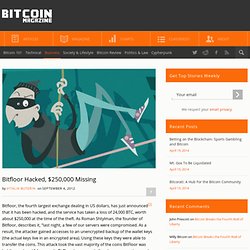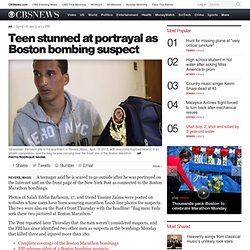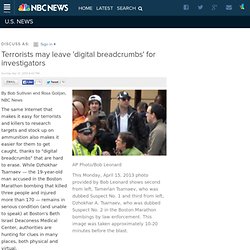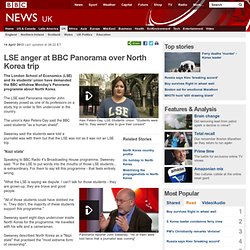

Bitfloor Hacked, $250,000 Missing. Bitfloor, the fourth largest exchange dealing in US dollars, has just announced[1] that it has been hacked, and the service has taken a loss of 24,000 BTC, worth about $250,000 at the time of the theft.

When America Became a Cyberwarrior - By Jeffrey T. Richelson and Malcolm Byrne. At a time when Chinese malware is targeting America's computer infrastructure and U.S.

-Israeli worms (e.g., Stuxnet) have reportedly attacked Iranian centrifuges, a recently declassified item from the National Security Agency (NSA) offers a little history on how at least one part of the U.S. government foresaw its role in the growing field of "Information Warfare. " This short item from a classified NSA publication reveals that as far back as 1997 the super-secret agency was tasked with finding ways not just to listen in on our enemies (the NSA's usual stock-in-trade), but actually to attack hostile computer networks.
Cell phone video captures early morning Watertown shootout. AP Twitter account hacked, makes false claim of explosions at White House (update) Anyone that follows the Associated Press on Twitter just heard "news" of an unprecedented national crisis.

"Two Explosions in the White House and Barack Obama is injured," the AP's account tweeted moments ago. Thankfully onlookers were quick to call the tweet fake, no doubt aided by the fact that no other news agencies are reporting a dire situation at the White House. The formatting is also uncharacteristic of the style guide-enforcing AP, with a bizarre capitalization of "Explosions" and a reference to the president by his first name.
The news wire has since confirmed its account has been hijacked, referring to the tweet in question as "bogus. " That is a bogus @ap tweet. — AP CorpComm (@AP_CorpComm) April 23, 2013 The (at)AP twitter account has been hacked. But effects of the major hack — not the first to impact a news agency on Twitter — are already being felt. Google Glass: Obnoxious and invasive at any price. Wearable computing has long been part of the holy grail of the pursuit towards integration of information science with human interface devices.

We've seen its use described in popular science-fiction novels and shown in movies and television (like "Star Wars" and "Star Trek") and has been the fodder of futurists for longer than I can possibly remember. There's no question that these devices will be used extensively, particularly in vertical markets for specific types of applications where hands-free computing has distinct advantages, such in the medical and military fields, as well as in breaking news reporting. But products like Google Glass will face numerous adoption challenges because they present issues in any number of social situations where privacy or desire to be "off the record" is most cherished. One might ask, why are privacy issues with Glass any different than any other device that can record, such as a smartphone or a miniature tablet?
Teen stunned at portrayal as Boston bombing suspect. Salaheddin Barhoum sits in his apartment in Revere, Mass., April 18, 2013, with one of the trophies he won in an athletic competition, and the bag he was carrying near the finish line of the Boston Marathon.

AP Photo/Rodrique Ngowi REVERE, Mass. A teenager said he is scared to go outside after he was portrayed on the Internet and on the front page of the New York Post as connected to the Boston Marathon bombings. Photos of Salah Eddin Barhoum, 17, and friend Yassine Zaime were posted on websites whose users have been scouring marathon finish line photos for suspects. Terrorists may leave 'digital breadcrumbs' for investigators. AP Photo/Bob Leonard This Monday, April 15, 2013 photo provided by Bob Leonard shows second from left, Tamerlan Tsarnaev, who was dubbed Suspect No. 1 and third from left, Dzhokhar A.

Tsarnaev, who was dubbed Suspect No. 2 in the Boston Marathon bombings by law enforcement. This image was taken approximately 10-20 minutes before the blast. By Bob Sullivan and Rosa Golijan, NBC News The same Internet that makes it easy for terrorists and killers to research targets and stock up on ammunition also makes it easier for them to get caught, thanks to "digital breadcrumbs" that are hard to erase. "The big thing they are trying to determine is the radicalization," Mark Rasch, former head of the Justice Department's computer crime unit and now an independent consultant at MarkDRasch.com, explained to NBC News.
"The first place you find digital breadcrumbs is in deleted or cached files," Rasch explains. INSEIT - Home. Center for Digital Ethics and Policy. LSE anger at BBC Panorama over North Korea trip. 14 April 2013Last updated at 08:22 ET Alex Peters-Day, LSE Students Union: "Students were lied to, they weren't able to give their consent" The London School of Economics (LSE) and its students' union have demanded the BBC withdraw Monday's Panorama programme about North Korea.

The LSE said Panorama reporter John Sweeney posed as one of its professors on a study trip in order to film undercover in the country. Digital ethics and safety.